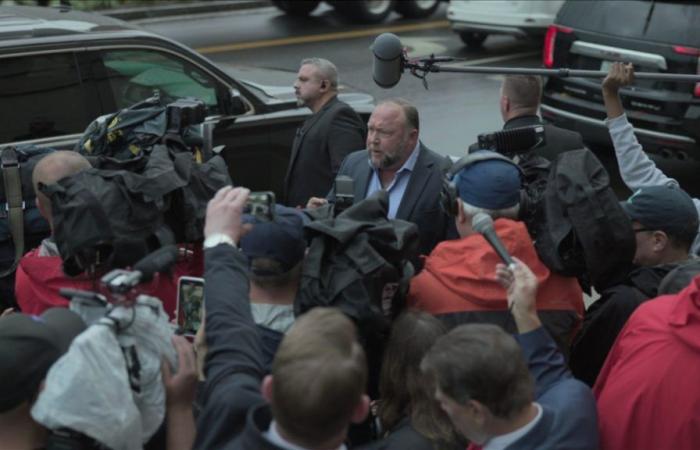Director Dan Reed developed an obsession with what he calls “the mass consumption of lies” when he started researching Horror at the Mall, his documentary about the Westgate shopping center attack of 2013. When Reed initially googled the mass slaying that killed at least 67 people, “the top results were that it was all a hoax, and the blood was fake, and all the people were actors. ” At the time, it was more unusual than it is today to hear prominent voices denying the undeniable. Then, as now, one of the loudest such voices was conspiracy theorist, online personality, and vitamin salesman Alex Jones.
“I’ve watched more InfoWars than any human being should have to,” Reed says, referring to Jones’s public access turned online talk show, The Alex Jones Show (which many watch via Jones’s InfoWars website). That’s not because he’s a fan of Jones’s far-right, fringe-interesting content, but because of Jones’s vociferous denial of the 2012 Sandy Hook Elementary School attack, in which 26 people were fatally shot by a single man. The talk show host long insisted that the shooting, in which 20 children aged six and seven years old were killed, was a lie. That claim forms the foundation of Reed’s new documentary, The Truth vs. Alex Jones, which debuts on HBO March 26.
At the time of the Newtown, Connecticut shooting, mass slayings were far rarer in the US than they are now. (According to the National Institute of Health, there were 269 in 2013. There were 656 in 2023.) But according to Jones at the time, crimes like the one at Sandy Hook were a “false flag,” made-up events that would be used to strip patriotic Americans of their Second Amendment rights. On his show and his website, Jones and his staff took specific aim at the parents of the children slain at the school, breaking down interviews and footage with false explanations of how it was prominently faked. Jones’s enormous, passionate audience turned against the grieving people, harassing them online and off.
Reed was no stranger to online falsehoods by the time several of these parents filed suit against Jones, claiming that he had defamed them with his claims that the shooting hadn’t happened. The British filmmaker also directed and produced Leaving Neverland, the 2019 documentary that detailed the multiple allegations of child sexual abuse against late pop star Michael Jackson: “I got trolled a lot by people denying that anything bad could have happened with the great King of Pop.” That experience put in Reed’s head “the notion that lies are being told on this vast scale. And there’s a huge market for them.” (Reed declined to comment when asked about an upcoming dramatic film adaptation of Jackson’s life, saying that the critical remarks he’d made elsewhere were all he’d like to say at present.)
Reed is emphatic that The Truth vs. Alex Jones isn’t a film about Sandy Hook. But there isn’t any way to follow the litigation against Jones without establishing, for those sitting in the back, that the shooting did indeed occur. Daniel Jewiss, a now retired Connecticut State Police detective who led the shooting investigation, spends six minutes of screen time explaining exactly what happened. “His name’s on the top of the report, and he knows it back to front,” Reed says.
“He did this incredible thing of going through each room and going through each step” of the attack, saying the name of every victim in the massacre. That wasn’t something Reed asked him to do, and in fact, “it didn’t hit me with the force that it has in the film. But then once my editor put it together with the forensic pictures, it became this really sort of solemn and, I hope, restrained telling of the story.”
It’s remarkably painful to watch, especially when paired with footage of the parents who spoke with Reed for the film. Then we’re subjected to clip after clip of Jones mocking the parents and spreading misinformation before he switches gears to urging viewers to purchase his line of supplements. It’s enough to make one wonder if Jones is mentally ill, or subject to powerful delusions. At least, until we get to the part of the documentary where Jones appears in court.
Though Jones did not participate in the current defamation trials against him, he was found liable by default in cases in Connecticut and Texas. By then, Reed was knee-deep in the documentary, but couldn’t be sure that Jones would ever appear in court. When it came time to determine damages, however, Jones took the stand in both cases. “And all his fantasies fell apart in court, and he was exposed as a con man,” Reed says.
In Reed’s view, while there are plenty of people who genuinely believe that the school shooting was fake, Jones isn’t among them. In deposition footage from the film, we see members of the InfoWars team admit that sales of Jones’s products would spike when he’d make controversial or outlandish statements. The claims about Sandy Hook, the parents’ lawyers argued, were a lever to spur sales.
Tags: Truth Alex Jones Infuriating Misinformation Pays
--





